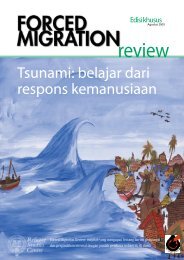FMR 42 full issue pdf - Forced Migration Review
FMR 42 full issue pdf - Forced Migration Review
FMR 42 full issue pdf - Forced Migration Review
Create successful ePaper yourself
Turn your PDF publications into a flip-book with our unique Google optimized e-Paper software.
<strong>FMR</strong> <strong>42</strong><br />
Sexual orientation and gender identity and the protection of forced migrants 5<br />
Ensuring protection for LGBTI Persons of Concern<br />
Volker Türk<br />
Lesbian, gay, bisexual, transgender and intersex (LGBTI) asylum seekers and refugees face a<br />
myriad of threats, risks and vulnerabilities throughout all stages of the displacement cycle.<br />
There needs to be greater awareness not only of the specific protection concerns relating<br />
to LGBTI individuals but also of related jurisprudence and guidance available for UN staff,<br />
partners, state authorities and decision-makers.<br />
At the centre of the 1951 Refugee Convention<br />
are human dignity, the richness and diversity<br />
of human life, and the <strong>full</strong> expression of<br />
individual freedoms. The very purpose of<br />
the Convention is the protection of those<br />
who manage to flee predicaments that<br />
violate their dignity, identity and freedoms.<br />
Despite the fact that there was no explicit<br />
recognition in the Convention of persecution<br />
for reasons of sexual orientation or gender<br />
identity, its drafters used broad enough<br />
language to cover such instances, notably<br />
through the introduction of the ‘membership<br />
of a particular social group’ ground.<br />
I have no doubt that the framers of both<br />
the Universal Declaration of Human Rights<br />
and of the 1951 Convention were aware<br />
of what had happened in Nazi Germany<br />
to LGBTI people. People were arrested on<br />
suspicion of homosexuality and many were<br />
incarcerated in concentration camps. We<br />
will never know how many LGBTI persons<br />
fled Nazi Germany to avoid ending up in<br />
the camps. As homosexuality was – and<br />
remains in many societies – a social stigma<br />
and a criminal offence, they would have<br />
been forced to hide their reasons for flight<br />
even in their new countries of asylum.<br />
Unfortunately, this remains the situation<br />
for LGBTI asylum seekers and refugees<br />
in many parts of the world today.<br />
There has been growing awareness in<br />
recent years about the rights of LGBTI<br />
individuals within the human rights and<br />
humanitarian community and an emergence<br />
of a body of research on this topic. The<br />
2007 Yogyakarta Principles, in particular,<br />
have made a significant contribution to a<br />
better appreciation of how human rights<br />
norms apply and are to be interpreted<br />
in the context of sexual orientation and<br />
gender identity. 1 It is perhaps premature to<br />
assess the role played by the Principles in<br />
making concrete improvements in the lives<br />
of LGBTI people; however, encouragingly,<br />
the Principles have been drawn upon on<br />
numerous occasions by the UN (including<br />
UNHCR), states, activists, asylum courts and<br />
tribunals, and have a constructive role to<br />
play as a legal, practical and advocacy tool.<br />
For almost two decades the UN has<br />
documented violations against LGBTI people<br />
and articulated human rights standards in<br />
the context of sexual orientation and gender<br />
identity. More recently, the UN has called,<br />
at the highest levels, for equal rights, nondiscrimination,<br />
an end to violence and the<br />
abrogation of laws that criminalise same-sex<br />
relationships. And in May 2012, the UN High<br />
Commissioner for Refugees <strong>issue</strong>d a message<br />
to all UNHCR staff, encouraging them to<br />
help improve protection for LGBTI persons of<br />
concerns as well as to eliminate homophobia<br />
and transphobia in the workplace.<br />
Issues in jurisprudence<br />
Since the first refugee claims based on<br />
sexual orientation and gender identity were<br />
recognised in the 1980s, jurisprudence in<br />
this area of refugee law has continued to<br />
evolve, though at times with diverging<br />
views in different jurisdictions. We have<br />
identified a number of <strong>issue</strong>s in this regard.<br />
The first is that of demanding ‘discretion’ –<br />
that is, concealing one’s sexual orientation<br />
in order to avoid persecution. The idea that<br />
gay people should have to tolerate being<br />
‘discreet’ about their sexual orientation was




